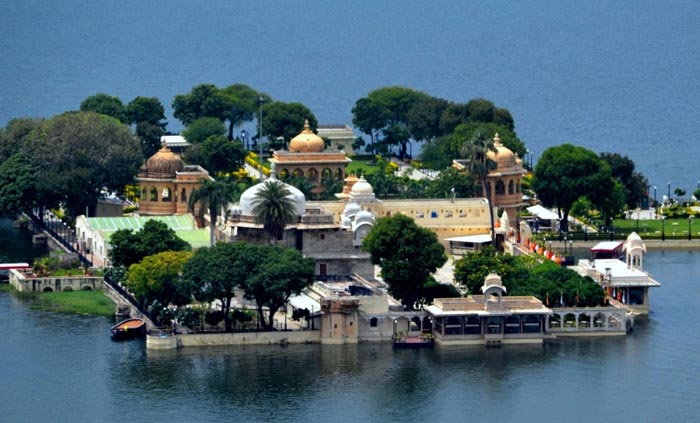Jag Temple

Information of Jag Temple, Udaipur, Rajasthan
Jag temple is considered to be a palace that has been constructed on an island in the Lake Pichola. It is also known as the 'Lake Garden Palace' which has been situated in Udaipur city in Rajasthan. The credit of construction of this Mandir goes to three Maharanas belonging to Sisodia Rajputs of Mewar kingdom. The construction work began in 1551 by King Maharana Amar Singh which was further continued by Maharana Karan Singh and completed by Maharana Jagat Singh and since then it has been named as Jagat Mandir. This Mandir was basically utilized by the royal family as a summer resort.
Jag Temple Religious Significance
The Mandir tends to hold huge significance as it is the symbol of peace and a beautiful place where you can spend some beautiful moments. One of the most hearts touching point to note is that Taj Mahal draws some inspiration from peitra dura work of this palace.
Jag Temple Mythology & History
The history of Jag Mandir began with the Maharana Karan Singh's kindness towards Emperor Shahjahan. Prior to being crowned as a Mughal Emperor, Shahjahan was known as Prince Khurram. He revolted against his father Emperor Jahangir in 1623 as he wanted to be the beneficiary to Mughal throne. Facing the risk of being ruined in his campaign, he sought refugee in Mewar Kingdom at Udaipur where he was given a shelter to live by Maharana Karan Singh. He was previously concealed in City Palace with his wife Mumtaz Mahal and his sons' named prince Dara and Prince Aurangzeb. After some time they were transferred to Gul Mahal which is situated in the middle of the lake. Gul Mahal was specially constructed for Khurram by Maharana Karan Singh. After some time the Mahal was enlarged by his son Jagat Singh into a big palace and named it as Jag Mandir Palace.
Jag Temple Architectural Significance
The structure in this three storied Mandir includes Gul Mahal which was basically developed for prince Khurram, the beautiful facade that has been decorated with four carved statues of elephants on both sides of the entry on the lake of Udaipur, the garden courtyard, Bara Patharon ka Mahal and the Zenana Mahal. Jag Mandir is basically the main Mandir that includes the Gul Mahal. The towers of palace are octagonal in shape and have been covered with cupolas. The maze of the reception hall, residential suites as well as internal courts were constructed inside the Mandir itself and were made in Rajput and Mughal architectural styles. There is a residence of royal ladies chamber just near the palace and the Kunwar Pada ki Mahal is situated in the western end. There is a beautiful garden within the palace complex itself comprising of yew bushes, jasmine, frangipani, palm trees, verbena and moss rose. The courtyard has black as well as white tiles. The present Maharanas tends to host numerous parties here and it also rents this place for any type of private parties. This temple can only be reached by boat that can be taken from Bansi Ghat jetty which is situated next to the Lake Palace. There is a Darikhana at the northern side of the Mandir which was a terrace made up of marble column. At present it is run as a restaurant by the present Maharana. There is a pavilion at the entrance of the Mandir which is white porch of cusped arches. The pavilion has been adorned with huge elephants made up of stone.
- Andhra Pradesh Temples
- Assam Temples
- Bihar Temples
- New Delhi Temples
- Goa Temples
- Gujarat Temples
- Jammu and Kashmir Temples
- Karnataka Temples
- Kerala Temples
- Madhya Pradesh Temples
- Maharashtra Temples
- Odisha Temples
- Punjab Temples
- Rajasthan Temples
- Sikkim Temples
- Tamil Nadu Temples
- Telangana Temples
- Uttar Pradesh Temples
- Uttarakhand Temples
- West Bengal Temples